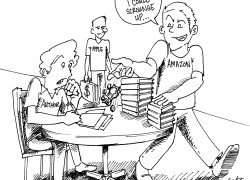
Apple Inc. and five major book publishers were recently charged by the U.S. Justice Department with colluding to raise e-book prices.
Apple, however, is fighting the charges, saying, “The Department of Justice’s accusation of collusion against Apple is simply not true. The launch of the iBookstore in 2010 fostered innovation and competition, breaking Amazon’s monopolistic grip on the publishing industry.”
Before Apple, Simon & Schuster, Hachette Book Group, HarperCollins Publishers, Macmillan and Penguin Group fixed e-book prices, Amazon controlled 90 percent of the e-book market. Now, it holds 60 percent, Barnes & Noble holds 30 percent and Apple holds nearly 10 percent of the market.
To successfully charge Apple Inc. with collusion, the Justice Department will have to prove Apple worked with the other publishers together, as opposed to individually, to raise prices.
The Justice Department accused Apple and the others of raising the prices of e-books anywhere from $3 to $5, costing consumers tens of millions of dollars.
Currently, Amazon does not allow publishers to set the prices of their e-books.
Described as “ruinous competition,” publishers and other distributors are forced to sell their books at the same low prices, even if they lose money.
In the current model, only consumers and Amazon benefit from e-book pricing, but for how long will consumers profit if authors stop writing?
The share Amazon takes from selling the e-book, in addition to its price cuts, creates such a deficit to publishers that authors are hurt in the process.
The cost of a book is not decided on a whim. Production costs – including payment to the author, editors, designers, printers and e-book developers – as well as enough money to give the publisher a profit, are included in the price of books and e-books.
If publishers are taking a hit so great that they can’t cover those costs – let alone make a profit – eventually they will stop printing, and that will hurt the consumers more than anything.
This is not a defense of collusion. If Apple did in fact collude with the other publishers to raise prices, it should be punished.
Precedent says ruinous competition, like what Amazon is doing, is not an excuse for collusion, but something needs to be done about the near monopoly Amazon has on the market.
Since the lawsuit, Amazon’s shares have risen again, while the rest have lowered.
A company owning nearly 90 percent of the market is not healthy in any industry. Yes, consumers save money, but what amount of savings is worth risking the integrity of an entire industry?
Book publishers should not expect to make the same amount of money off hard copy or e-books as they previously made, but they should not be driven to take a loss either.
While we may tempted to go to bookstores and use the scanners on our smartphones to look for lower prices on Amazon, we need to ask ourselves who Amazon is sacrificing to create these low prices.
Low prices are great, but sometimes the savings is not worth it. Look at who you’re supporting when you make a purchase.
Sometimes it’s worth it to pay the higher price.
